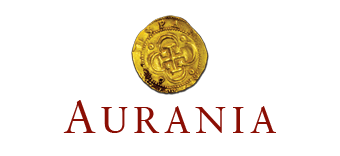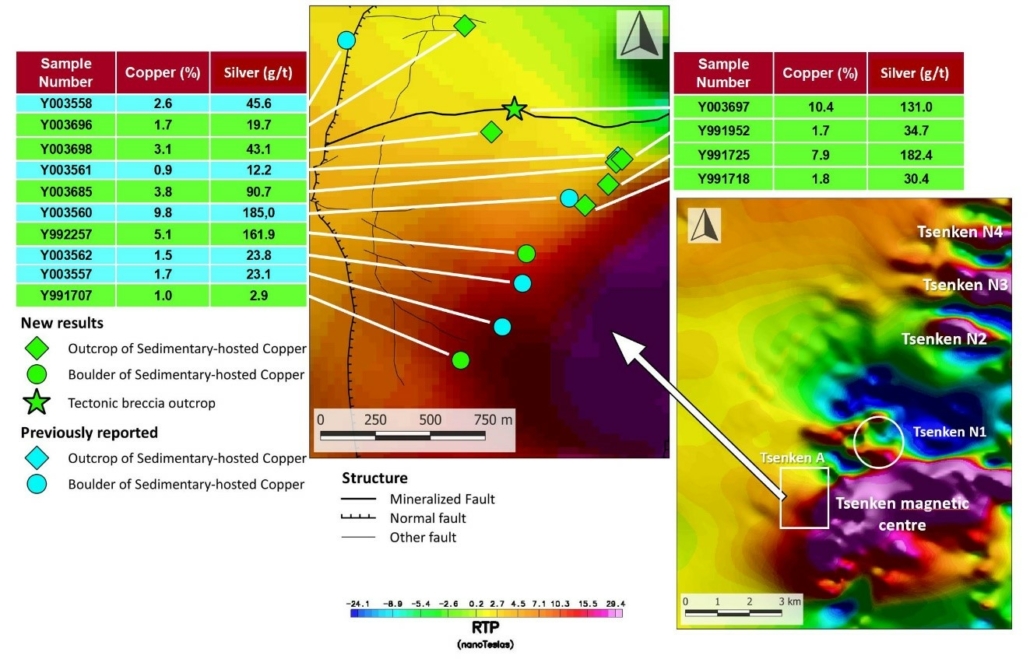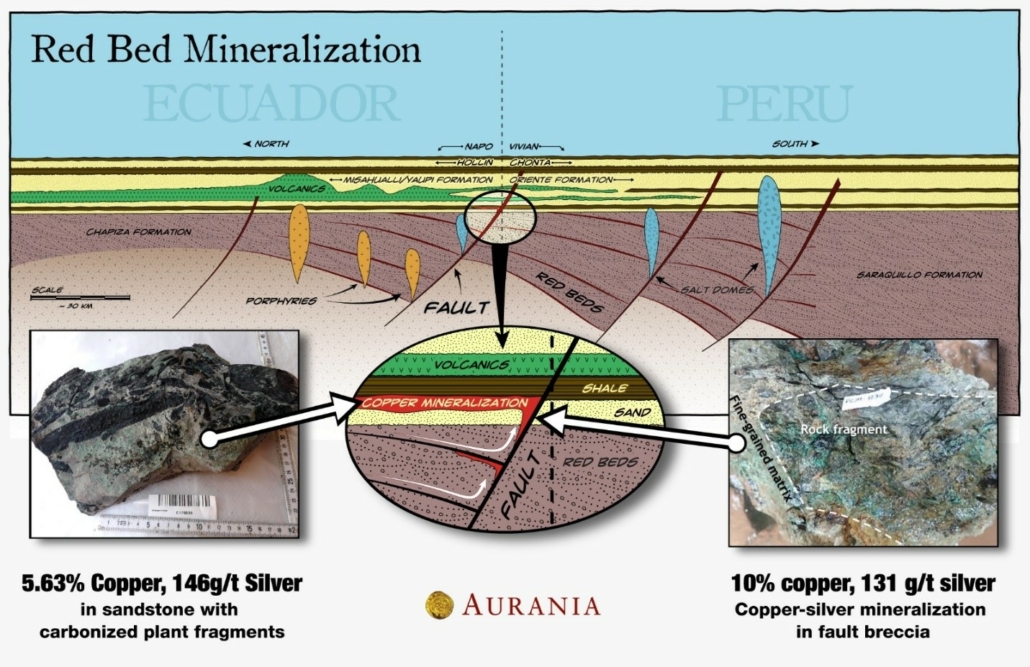Toronto, Ontario, July 21, 2020 – Aurania Resources Ltd. (TSXV: ARU) (OTCQB: AUIAF) (Frankfurt: 20Q) (“Aurania” or the “Company”) is pleased to report that grades of up to 10% copper with 131 grams per tonne (“g/t”) silver have been found in a breccia in the Tsenken A target area in its Lost Cities – Cutucu Project (“Project”) in southeastern Ecuador. Tsenken A is located approximately 2 kilometres from the Tsenken N1 target reported on last week (Figure 1 and see press release dated July 16, 2020). These latest results provide key information about sedimentary-hosted copper-silver at the Tsenken A target.
Dr. Keith Barron, Chairman and CEO of Aurania commented, “As has been previously discussed by sedimentary copper expert Professor Gregor Borg, sedimentary hosted copper-silver has not previously been found in close proximity to porphyries in any of the recognized copper camps internationally. Our Project is clearly something different and potentially important, but the relationship to porphyry and the geometry will ultimately be determined by drilling, which we intend to initiate in the 3rd quarter of this year. Sedimentary-hosted copper-silver has been found regionally within the Aurania concessions over an extent of 23 kilometres and is almost always associated with carbon-bearing shales and sandstones full of plant fossils. It is conceivable that steeply-dipping faults were conduits for metal-bearing fluids coming from depth. In many geological scenarios the thickest and highest-grade portions of systems are areas of greatest focussed fluid flow, and these are potentially attractive targets in a broader regional context.”
To view the previously released video with Professor Gregor Borg, click on the following link: https://aurania.com/the-opportunity-a-copper-experts-opinion-2/
Fault-related Mineralization at Tsenken A
A rock-chip sample from a fault breccia outcrop assayed 10% copper with 131g/t silver. High-grade copper-silver has been found in blocks in streams and in outcrop over a large area in the Tsenken A target area. Results have been reported in press releases dated January 10, 2019 and April 2, 2019, with additional assays shown in Figure 1. Mineralization occurs in bleached layers in the red sandstone host rock, and invariably is with carbonized, fossilized plant fragments. Copper minerals include malachite, chrysocolla and tenorite with minor chalcocite.
Figure 1. Location of fault breccia and sedimentary-hosted mineralization of high-grade copper-silver from the Tsenken A target area shown on a background of magnetic data (negative reduction to the equator, which is roughly equivalent to reduction to the pole (“RTP”)).
Figure 2. An idealized vertical slice through southern Ecuador and northern Peru showing the red-bed sandstones that accumulated against faults that were forming approximately 160 million years ago (constituting the Chapiza – Saraquillo Formations). The exploration model includes copper-silver – bearing fluid rising up the faults (which are mineralized) and seeping into permeable sedimentary layers, preferably where they are sealed by an overlying impermeable layer such as shale. Carbon within the permeable layers causes copper and silver to precipitate.
Sample Analysis & Quality Assurance / Quality Control (“QAQC”)
Laboratories: The soil samples were prepared for analysis at MS Analytical (“MSA”) in Cuenca, Ecuador, and the analyses were done in Vancouver, Canada.
Sample preparation: The rock samples were jaw-crushed to 10 mesh (crushed material passes through a mesh with apertures of 2 millimetres (“mm”)), from which a one-kilogram sub-sample was taken. The sub-sample was crushed to a grain size of 0.075mm and a 200 gram (“g”) split was set aside for analysis.
Analytical procedure: Approximately 0.25g of rock pulp underwent four-acid digestion and analysis for 48 elements by ICP-MS. For the over-limit samples, those that had a grade of greater than 1% copper and 100g/t silver, 0.4 grams of pulp underwent digestion in four acids and the resulting liquid was diluted and analyzed by ICP-MS.
QAQC: Aurania personnel inserted a certified standard pulp sample, alternating with a field blank, at approximate 20 sample intervals in all sample batches. Aurania’s analysis of results from its independent QAQC samples showed the batches reported on above, lie within acceptable limits. In addition, the labs reported that the analyses had passed their internal QAQC tests.
Qualified Person
The technical information contained in this news release has been verified and approved by Jean-Paul Pallier, MSc. Mr. Pallier is a designated EurGeol by the European Federation of Geologists and is a Qualified Person as defined by National Instrument 43-101, Standards of Disclosure for Mineral Projects of the Canadian Securities Administrators.
About Aurania
Aurania is a mineral exploration company engaged in the identification, evaluation, acquisition and exploration of mineral property interests, with a focus on precious metals and copper in South America. Its flagship asset, The Lost Cities – Cutucu Project, is located in the Jurassic Metallogenic Belt in the eastern foothills of the Andes mountain range of southeastern Ecuador.
Information on Aurania and technical reports are available at www.aurania.com and www.sedar.com, as well as on Facebook at https://www.facebook.com/auranialtd/, Twitter at https://twitter.com/auranialtd, and LinkedIn at https://www.linkedin.com/company/aurania-resources-ltd-.
For further information, please contact:
| Carolyn Muir
VP Investor Relations Aurania Resources Ltd. (416) 367-3200 |
Dr. Richard Spencer
President Aurania Resources Ltd. (416) 367-3200 |
Neither the TSX Venture Exchange nor its Regulation Services Provider (as that term is defined in the policies of the TSX Venture Exchange) accepts responsibility for the adequacy or accuracy of this release.
Forward-Looking Statements
This news release may contain forward-looking information that involves substantial known and unknown risks and uncertainties, most of which are beyond the control of Aurania. Forward-looking statements include estimates and statements that describe Aurania’s future plans, objectives or goals, including words to the effect that Aurania or its management expects a stated condition or result to occur. Forward-looking statements may be identified by such terms as “believes”, “anticipates”, “expects”, “estimates”, “may”, “could”, “would”, “will”, or “plan”. Since forward-looking statements are based on assumptions and address future events and conditions, by their very nature they involve inherent risks and uncertainties. Although these statements are based on information currently available to Aurania, Aurania provides no assurance that actual results will meet management’s expectations. Risks, uncertainties and other factors involved with forward-looking information could cause actual events, results, performance, prospects and opportunities to differ materially from those expressed or implied by such forward-looking information. Forward looking information in this news release includes, but is not limited to, Aurania’s objectives, goals or future plans, statements, exploration results, potential mineralization, the corporation’s portfolio, treasury, management team and enhanced capital markets profile, the estimation of mineral resources, exploration and mine development plans, timing of the commencement of operations and estimates of market conditions. Factors that could cause actual results to differ materially from such forward-looking information include, but are not limited to, failure to identify mineral resources, failure to convert estimated mineral resources to reserves, the inability to complete a feasibility study which recommends a production decision, the preliminary nature of metallurgical test results, delays in obtaining or failures to obtain required governmental, regulatory, environmental or other project approvals, political risks, inability to fulfill the duty to accommodate indigenous peoples, uncertainties relating to the availability and costs of financing needed in the future, changes in equity markets, inflation, changes in exchange rates, fluctuations in commodity prices, delays in the development of projects, capital and operating costs varying significantly from estimates and the other risks involved in the mineral exploration and development industry, and those risks set out in Aurania’s public documents filed on SEDAR. Although Aurania believes that the assumptions and factors used in preparing the forward-looking information in this news release are reasonable, undue reliance should not be placed on such information, which only applies as of the date of this news release, and no assurance can be given that such events will occur in the disclosed time frames or at all. Aurania disclaims any intention or obligation to update or revise any forward-looking information, whether as a result of new information, future events or otherwise, other than as required by law.






